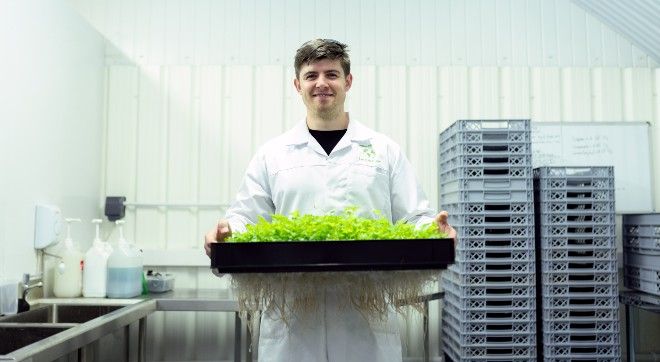The Power of Education: A Conversation With Crimson CEO Jamie Beaton
Read now/f/64062/3360x1890/e81c9d5283/jamie-slide-visual.png)
/f/64062/992x662/beb5f036e3/campus-5.jpg)
Jump To
Overview of Biochemistry Opportunities
Stepping Stones to Biochem Careers
Research and Development
Professions in Diverse Industries
Entrepreneurship and Innovation
Are you contemplating whether to major in biochemistry, or already knee-deep in your biochemistry program, wondering what awaits you beyond graduation? Well, you've come to the right place because we're diving into the exciting world of biochemistry careers.
There are many solid reasons why biochemistry is a good major, but we’ll help you discover just how many different professional pathways you can consider and why biochemists have promising and rewarding career prospects!
Before we delve into the specific career paths, let's recognize the significance of biochemistry in modern science.
Biochemistry involves applying concepts and methods from both biology and chemistry, so it is also referred to as biological chemistry.
Biochemistry is the science that explores the intricate chemical processes that occur within living organisms. It's the bridge between biology and chemistry, unlocking the secrets of life itself.
Some experts suggest that biochemistry was born in the year 1833, when a scientist named Anselme Payen discovered the enzyme now known as amylase. This discovery proved that chemical reactions happen in living organisms.
Since then, biochemists have determined that the human body consists almost entirely of just six elements: hydrogen, carbon, calcium, nitrogen, oxygen, and phosphorus.
More recently, biochemistry discovery and innovation have been truly explosive — which is why demand for qualified biochemists is forecast to grow dramatically as well.
| OCCUPATION | GROWTH FORECAST 2022 – 2032 |
|---|---|
| Biochemists and Biophysicists | 7% (faster than average) |
| Medical Scientists | 10% (much faster than average) |
| Non-STEM Occupations | 2.3% (slower than average) |
Source: Bureau of Labor Statistics
Biochemistry has shined light onto our understanding of cellular reproduction, heredity, and genetics. So biochemists are now playing a central role in amazing new discoveries in pharmacology and gene therapy.
Biochemists also apply genetic analysis in a range of forensic roles.
And, since biochemists focus on elements of chemistry linked to the life sciences, they should also be able to land meaningful and lucrative jobs in environmental science roles.
So, biochemistry is a vibrant sector of scientific research today, and the right biochemistry degrees and qualifications should open doors to meaningful, well-paid jobs, in medicine, biology, forensics, environmental work, education, and several other sectors as well.
Applications to STEM programs have increased dramatically in recent years, in response to the increased demand for these skills in the workforce.
However, getting into the STEM workforce not only requires navigating a crowded space at top schools, but most people would consider biochem to be a pretty hard major. You’re going to need a strong foundation academically — before college — in subjects such as biology, physics, chemistry, and math.
Starting early is key in STEM fields — for getting into better colleges and for navigating the academic challenges that come with studying biochemistry or other STEM subjects as an undergraduate.
With an associate degree (AA) in biochemistry you can qualify for entry-level jobs, such as a lab technician for example. Some students might use an AA degree and a good entry-level job as a stepping stone to further professional learning and career advancement over time.
However, you’re likely to find that getting a bachelor degree (BS/BA) or even a postgraduate degree, will help you find better opportunities, given the complex concepts you need to master to work as a biochemist.
The bright part of it all? While a college degree in biochemistry isn’t easy for most people, the return on investment for STEM degrees in general is expected to be far better than average.
In a bachelor degree program, you can pursue a BS (bachelor of science) vs BA (bachelor of arts).
Most students interested in a biochem major will go for a bachelor of science degree to be most qualified for jobs requiring technical skills.
But a bachelor of arts track in biochemistry may be a good fit if you’re thinking about an interdisciplinary approach, with study in areas such as law, communications, science education, or public policy.
For more advanced roles in research and development, in academia, or consulting, you may want to pursue graduate school, and aim for a higher degree, such as a master’s degree, or a doctoral degree.


If you’re a woman aiming to pursue a biochem degree in college, keep in mind that you may find programs out there to help you succeed.
From Harvard’s women in STEM mentoring program to initiatives of the US Office of Economic Security, to numerous professional associations and nonprofits organizations, there are many programs put in place to support the success of women in STEM learning and STEM professions.
Finally, before pursuing a biochemistry degree think ahead: what kinds of coursework and degree programs best align with your career interests and passions?…
Thinking ahead and fine tuning what kinds of specialized and complementary courses you squeeze into your academic program is important… Because, as you’re about to see, there is a stunning variety of biochemistry pathways and occupations out there requiring a wide range of varied skill sets…
Ever dreamt of making groundbreaking discoveries?
As a biomedical research scientist, you'll be at the forefront of scientific exploration. You'll delve into diseases, genetics, and cellular processes, contributing to scientific breakthroughs and medical advancements that can change the world.
If you’re wondering how central a role biochemists can play in modern medicine, take the case of Tony Hunter, a student in natural sciences and biochemistry who attended Cambridge during the 1960s.
Around 1980, Dr. Hunter discovered phosphotyrosine and today this discovery continues to have important implications for research in cellular reproduction and efforts to identify promising cancer therapies.
Women biochemists are pioneers of biochemistry research too!
Take the example of Dr. Jennifer Doudna…
Dr. Doudna is a rockstar woman biochemist of the 21st century! She earned a bachelor degree from Pomona College (one of the Claremont Colleges) and her doctoral degree from Harvard Medical School.
In 2020 she and another woman chemist, Emmanuelle Charpentier, won a Nobel Prize in Chemistry for discovering how to do genome editing. (And, it all started when her high school French teacher encouraged her to stick with science!)


Today Dr. Doudna is a Professor of Chemistry and Molecular Cell Biology at UC Berkeley and President and Chair of the Innovative Genomics Institute.
With biotech emerging as a primary terrain of innovation in the 21st century, biochemists pursuing specializations in medical research are likely to have abundant career prospects before them!
Check out:
Pharmaceutical sciences offer another great professional pathway for biochemistry majors.
Pharmaceutical scientists are responsible for developing drugs and therapeutic treatments. And, with this kind of expertise, you could work in many roles, including not only research and development, but post-development too: ensuring product safety, efficacy, and regulatory compliance, for example.
It might seem hard to believe at first, but by working in pharmaceutical science you could find yourself using what you learn as a biochemistry major to improve or save countless lives.
| OCCUPATION | DEGREE | AVERAGE YEARLY SALARY |
|---|---|---|
| Biochemists and Biophysicists | Doctorate or professional degree | $103,810 |
| Biological Technicians | Bachelor degree | $49,650 |
| Chemists and Materials Scientists | Bachelor degree | $81,810 |
| Pharmacists | Doctorate or professional degree | $132,750 |
Source: Bureau of Labor Statistics
Biochemists with the right qualifications can also pursue opportunities working in hospitals, doctors’ offices, or medical diagnostic labs. These job settings offer many entry-level technician roles related to patient care and diagnostic testing, as well as more advanced analysis, diagnosis, and research roles.
For those who want to make a tangible impact on patient care, becoming a clinical biochemist is an excellent choice. You'll analyze patient samples to diagnose diseases, working closely with medical teams to provide accurate diagnoses and treatment recommendations.
In hospital laboratories, medical laboratory scientists perform crucial tests and analyses, playing a vital role in patient care and treatment decisions. It's a career that combines your love for science with a genuine desire to help people.
| OCCUPATION | DEGREE | AVERAGE YEARLY SALARY |
|---|---|---|
| Medical Scientists | Doctorate or professional degree | $99,930 |
Source: Bureau of Labor Statistics
If you have a passion for biochemistry with a strong penchant for technology, then working as a biotechnologist could be a perfect niche.
As a biotechnologist, you'll apply molecular techniques to develop new products and processes. You might even find yourself collaborating on the design and development of technology tools that others can use to automate or optimize biochemistry research and applications.
Many emerging innovations and technologies — spanning genetic engineering, food and agricultural research, and biofuel production — should create steady demand for biotechnicians for years to come.
Quality control analysts ensure the safety and quality of products in biotech and pharmaceutical industries. Your attention to detail will help maintain industry standards, ensuring products meet the highest quality benchmarks.
As a quality control specialist, you’ll do testing and record keeping to monitor product quality or safety. You might also help organizations improve efficiencies, or optimize materials or processes used for production.
Most quality control analysts work in laboratories, manufacturing facilities, or offices. You may need a postgraduate degree to qualify for more advanced research roles.
Because so much is riding on scientific research and innovation in today’s modern economies, opportunities in STEM fields are growing quickly, creating demand for educators as well.
As the demand for trained biochemists continues to grow, you should find increasing opportunities to work in education and academia.
Passionate about teaching and mentoring the next generation of scientists? Becoming a college professor is a fulfilling path. You'll teach biochemistry courses at universities and colleges, all while contributing to academic research in your field.
In fact, it could be a tremendous time to pursue a path in higher education if you have the right science degrees, because of intense demand for educating a more robust STEM workforce.
If you do pursue this path, keep in mind that colleges and universities — and their various STEM departments — come with many different kinds of needs, students, departmental structures, and specializations.
This means the roles and responsibilities of a college professor can vary considerably, especially in terms of teaching in vocational programs vs. more academic programs, or taking on more extensive research.
To work in postsecondary education teaching or doing research, you’ll typically need a postgraduate degree in biochemistry. For more advanced teaching and research roles at the top STEM universities, you’ll typically need a doctoral degree.


Since many biochemists see themselves as scientists as they pursue their college education, they may not think about working as a science educator. But if you love biochemistry and have a passion for sharing that knowledge with others, you may find a career in science education is very rewarding.
And, with the need to prepare more students to succeed in college STEM programs, there’s a strong demand for talented science educators in K12 settings.
If you have a penchant for teaching and are enthusiastic about helping young people and promoting educational excellence, this path offers you a lifetime of opportunities to inspire, mentor, and educate the next generation in the company of other passionate education professionals.
| OCCUPATION | DEGREE | AVERAGE YEARLY SALARY |
|---|---|---|
| Postsecondary Teachers | Postgraduate degree | $80,480 |
| Instructional Coordinators | Master degree | $66,490 |
| High School Teachers | Bachelor degree | $62,360 |
Source: Bureau of Labor Statistics
Regulatory affairs specialists ensure that biochemistry products comply with government guidelines. Given the fact that many biochemistry products are highly regulated, biochemists play a pivotal role in helping important new products, drugs, and technologies get regulatory approval and stay in compliance in the midst of shifting regulatory landscapes.
As a regulatory affairs specialist or a biochemist supporting others in these roles, you’ll be working at the intersection of science, law, technology, and public affairs. If you’re inclined to combine your interest in biochemistry or biotechnology with a penchant for law or public policy, this specialized pathway is one where you might thrive.
If you're intrigued by the legal aspects of science, becoming a patent examiner is another less traditional path to consider.
As a patent examiner, you can work in private industry or for government regulators. You’ll get to use a mix of science expertise and legal analysis skills to evaluate patent applications for intellectual property rights in the biochemistry field.
According to the US Patent Office, US patent examiners earn salaries ranging from $61,325 to $93,052.
With additional experience and exceptional educational qualifications, this pathway might also lead to more advanced consulting roles or job opportunities with law firms.
Passionate about our planet's health? Environmental analysts study the impact of pollutants and toxins on ecosystems, contributing to environmental protection and conservation efforts.
Let’s face it, lots of environmentalists think about careers in public policy, law, or engineering. But, underneath it all are the life forces of natural environments impacted by man-made chemicals, pollutants, and toxins. In other words, biochemistry is a foundational science at the center of environmental investigation, monitoring, and testing.
In addition to biochemistry and environmental analysis, related academic and career pathways include: microbiology, environmental engineering, conservation science, and forestry.
Did you know that there are more microbes in a teaspoon of soil than there are people on earth?
Well, if you’re interested in agricultural science you may already know that’s true, and if not, well maybe you’re realizing just how fascinating it might be to work in this field…


And, as a chemist, you may already know that chemistry — in the form of carbon transmission that fuels soil life, or in terms of chemicals involved in photosynthesis — is foundational to soil and plant systems, and therefore, to agriculture.
As an agricultural scientist you’ll play an important role in developing sustainable agricultural practices and bio-based products. Your work can enhance crop yields, nutrition, and environmental resilience.
In an ag science career, you can make a positive impact on food production, help drive solutions for environmentally friendly farming practices, and contribute to solutions that support the livelihood of farmers.
| OCCUPATION | DEGREE | AVERAGE YEARLY SALARY |
|---|---|---|
| Microbiologist | Bachelor degree | $81,990 |
| Environmental Engineer | Bachelor degree | $96,530 |
| Environmental Science and Protection Technicians | Associate degree | $48,380 |
| Conservation Scientists and Foresters | Bachelor degree | $64,420 |
| Agricultural and Food Scientists | Bachelor degree | $74,940 |
Source: Bureau of Labor Statistics
There’s little doubt that the revolution in biotechnologies unfolding today will require contributions from the fields of bioinformatics and data analysis.
In the age of genomics, the role of bioinformatics specialists has become increasingly vital. These professionals are the data wizards of the biological world…
In fact, as gene-sequencing technologies advance, the volume of genomic data has exploded.
So, as a bioinformatician, you’ll likely play a pivotal role in deciphering these sequences, identifying genes, regulatory elements, and potential disease-causing mutations.
Bioinformaticians also contribute to discoveries related to diseases — both the mechanisms of diseases and promising treatments.
Combining biology with data-driven methodologies, data scientists in health sciences are at the forefront of a healthcare revolution. They use data to transform the way we diagnose, treat, and prevent diseases.
Data scientists in health sciences also use machine learning to anticipate disease outbreaks and trends.
For example, during the COVID-19 pandemic, data scientists analyzed vast amounts of data to predict the spread of the virus to inform public health measures.
These professionals also work on diagnostic algorithms that can assist in interpreting medical images like X-rays and MRIs.
Today, data-driven drug discovery is another fast-growing area where data scientists are front and center — saving lives and reducing the costs of R&D.
For the ambitious and entrepreneurial, starting your biotech company is a thrilling option. You can translate research into marketable products or solutions, driving innovation in the field.
Entrepreneurs and investors are likely to be on the look out for scientists interested in supporting an entrepreneurial culture with both scientific knowledge and managerial skills, as a consultant or marketing manager, for example.
If you want to combine a biochemistry degree with a degree in business administration, you should find that biotechnology proves to be a field ripe for entrepreneurial adventures for years to come.
If you have a gift for translating complex ideas into relatable language, consider a career in science communication. Becoming a science writer, blogger, or content creator is a path that can allow for lots of independence. It also allows you to bridge the gap between scientific research and public understanding.
Think about it, with biochemistry at the center of so many modern challenges and innovations, our society is going to see growing demand for technical writers in this field. In this role you’ll help all the non-scientists in the world make sense of new discoveries, insights, and technologies.
Technical writers and science writers will be needed for more than just supporting innovations in health sciences too… The world will also need writers with backgrounds in biochemistry to help with science education initiatives, and for accurate communications related to environmental issues.
So, if you’ve got an interest in developing professional communication skills as a biochemist, be sure to consider if technical writing and media communications might be the pathway you’re looking for!
| OCCUPATION | DEGREE | AVERAGE YEARLY SALARY |
|---|---|---|
| Technical Writer | Bachelor degree | $79,960 |
| Editors | Bachelor degree | $73,080 |
Source: Bureau of Labor Statistics
In conclusion, a biochemistry degree opens up a world of possibilities.
So, is biochemistry a good major? Absolutely — it's the field driving today’s greatest social and scientific challenges and innovations!
And we've explored just some of the diverse career paths available…
No matter which path you choose, remember that biochemistry is more than just a major — it's a journey of discovery, innovation, and making a positive impact on the world. Even more, as a biochemist you’re also going to be riding a huge wave of revolutionary innovation in the decades to come!
There’s good reason to be confident a biochemistry degree will deliver a solid return on your educational investment. So why not position yourself with the strongest academic accomplishments possible?
If you’re wondering what that could look like, book a free consultation. Together let’s explore your interests and kickstart your journey to an outstanding biochemistry career. We doubt you’ll ever look back…
What Makes Crimson Different